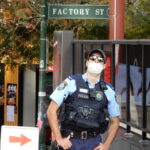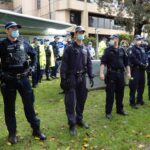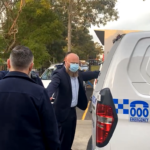“We Can’t Police Our Way Out of a Pandemic”: Shoebridge on Intensifying COVID Policing
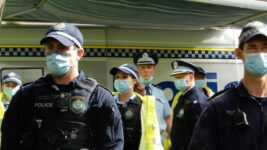
The NSW Parliament Public Accountability Committee held its first hearing this year into the NSW Government’s Management of the COVID-19 Pandemic inquiry on 10 August.
The meeting was confrontational as NSW health minister Brad Hazzard repeatedly blocked questions that committee members directed to Chief Health Officer Dr Kerry Chant, as he attempted to answer them on her behalf.
Queries were raised about whether health experts were behind the premier’s assertion that restrictions might have been eased at 50 percent vaccine coverage, with Hazzard suggesting that Berejiklian was rather giving “a sense of hope to the community” than outlining any real target.
As two days of inquiry hearings took place early last week, COVID-19 cases were beginning to emerge in regional NSW and the ACT, with both areas being ordered to lockdown mid-week, and a statewide shutdown was applied in this state from last Saturday onwards.
The move to lockdown all of NSW came as cases climbed to an all-time high on Saturday. And the authorities decided that what was needed to accompany the statewide shutdown was to turn the screw tighter on the ever-increasing law enforcement approach of the past seven weeks.
So, on Monday, the NSW Police Force launched Operation Stay at Home, which involves a dramatic increase in the fines that apply to breaches, an enhanced police and military presence on the streets, and the tightening of certain COVID restrictions.
The Joh Bailey cluster
“There are a number of critical things we heard about in the hearings,” said Public Accountability Committee chair David Shoebridge. “One of which was that the Chief Health Officer’s advice has not been followed in all respects by the government.”
“One obvious example was the premier’s push – which she has later shelved – to start opening up Greater Sydney once we got to 50 percent vaccination rates,” the NSW Greens MLC continued. “It was very clear there was no support for that coming from Dr Chant at all.”
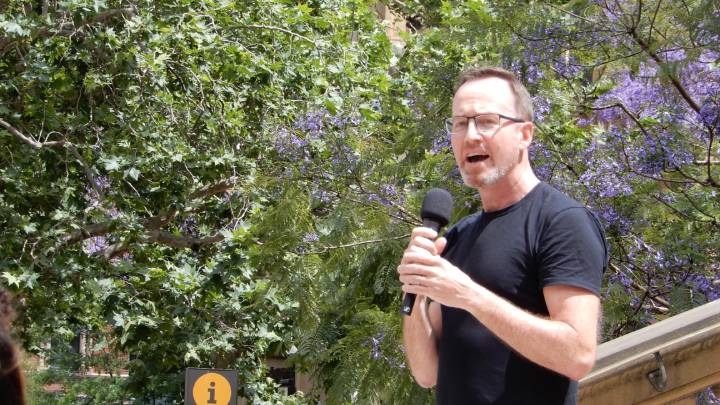
Shoebridge outlined that one early super spreader event that occurred in West Hoxton “wasn’t properly accounted for”, which meant that there were delays in locking down, as initial moves were confined to the Eastern Suburbs despite the virus having already spread out to the southwest.
Known as the Joh Bailey cluster, the West Hoxton event involved a hairdresser from Double Bay travelling out to a birthday party in the city’s southwest on 19 June. While this didn’t breach any public health restrictions, it did ultimately lead to 51 cases, 30 of which were acquired at the party.
“We also had the first acknowledgement that significant errors had been made in the initial decisions regarding the lockdown,” Shoebridge told Sydney Criminal Lawyers. “There was a ten day delay between the first community transmission of the Delta variant and the citywide lockdown.”
Policing a health crisis
The prioritisation of the high visibility policing of the pandemic has been contentious since it began in March 2020. Rather than assisting citizens in preventing virus transmission, oftentimes this response has seemed more about the mass criminalisation of certain sectors of the community.
This has been especially so during the current wave, which saw a laxed lockdown applied when it was believed the virus was contained in the wealthy east of the city, prior to a heavy-handed law enforcement approach being taken to poorer migrant communities in the southwest.
“NSW has put the police in charge of the pandemic response for the last 12 months. And that police led pandemic response isn’t working,” Shoebridge continued. “We can’t police our way out of a pandemic.”
The Greens justice spokesperson explained that it’s becoming increasingly apparent from the data that the transmission is happening in households, with people bringing it back from workplaces.
So, while residents are complying with health orders, they’re forced to venture out for economic reasons.
Yet, from the onset of the second wave, the Berejiklian government has acted from a position of “hubris”, with a belief that its 2020 response displayed a certain “NSW exceptionalism”, so rather than alter past strategies, the Liberals have reinforced them, despite evidence that they’re failing.
“The Coalition keep looking to their toolkit for public health responses, and all they seem to see are police and fines and punishment,” Shoebridge quipped. “The tools they’re missing are financial support, assistance and very clear and positive communication.”
The second wave continues
Right now, the entire state of NSW remains under lockdown. COVID case numbers are continuing to rise to their highest levels ever seen, the 28 August lifting of the lockdown seems highly unlikely, and the anti-lockdowners are planning to take to the streets yet again this Saturday.
But NSW and the rest of the nation are not alone in terms of the resurgence in the COVID crisis. The highly contagious Delta variant, which was first detected in India last October, is seeing a surge in cases globally, even in countries like the US, where the worst of the pandemic was thought over.
And the NSW police decision to intensify its presence along with penalties doesn’t seem a likely way to curb virus transmission, as if $1,000 infringement notices for noncompliance to COVID restrictions hasn’t stopped the disease spreading, it’s unlikely to be deterred by $5,000 fines.
“What we need in places like far west NSW and western and southwestern Sydney is not thousands of police intimidating residents,” Shoebridge continued. “We need thousands of social workers, nurses and public health officials reaching out to residents to help them get through this.”
The NSW Greens politician added that a community-based approach could see prominent members from different areas moving to dispel the myths surrounding vaccinations within these various populations and advising locals to go out and get the jab.
“We need resources so we can safely have people stay at home and not have to go to work, because they’re fearful about their economic survival,” Shoebridge concluded.
“They’re the lessons that have come out of this pandemic. It’s just that the government is refusing to learn them.”


